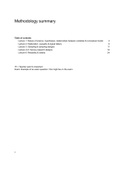Summary
Summary Methods, Measurements & Statistics (methods only)
- Course
- Institution
This is a summary for the methods part of Methods, Measurements and Statistics, based on the lectures given by Luc van Baest. This was all I needed for the exam, I didn't read the books! It is in English, so also suitable for international students. :) Additionally, I translated some words to Dutch...
[Show more]



